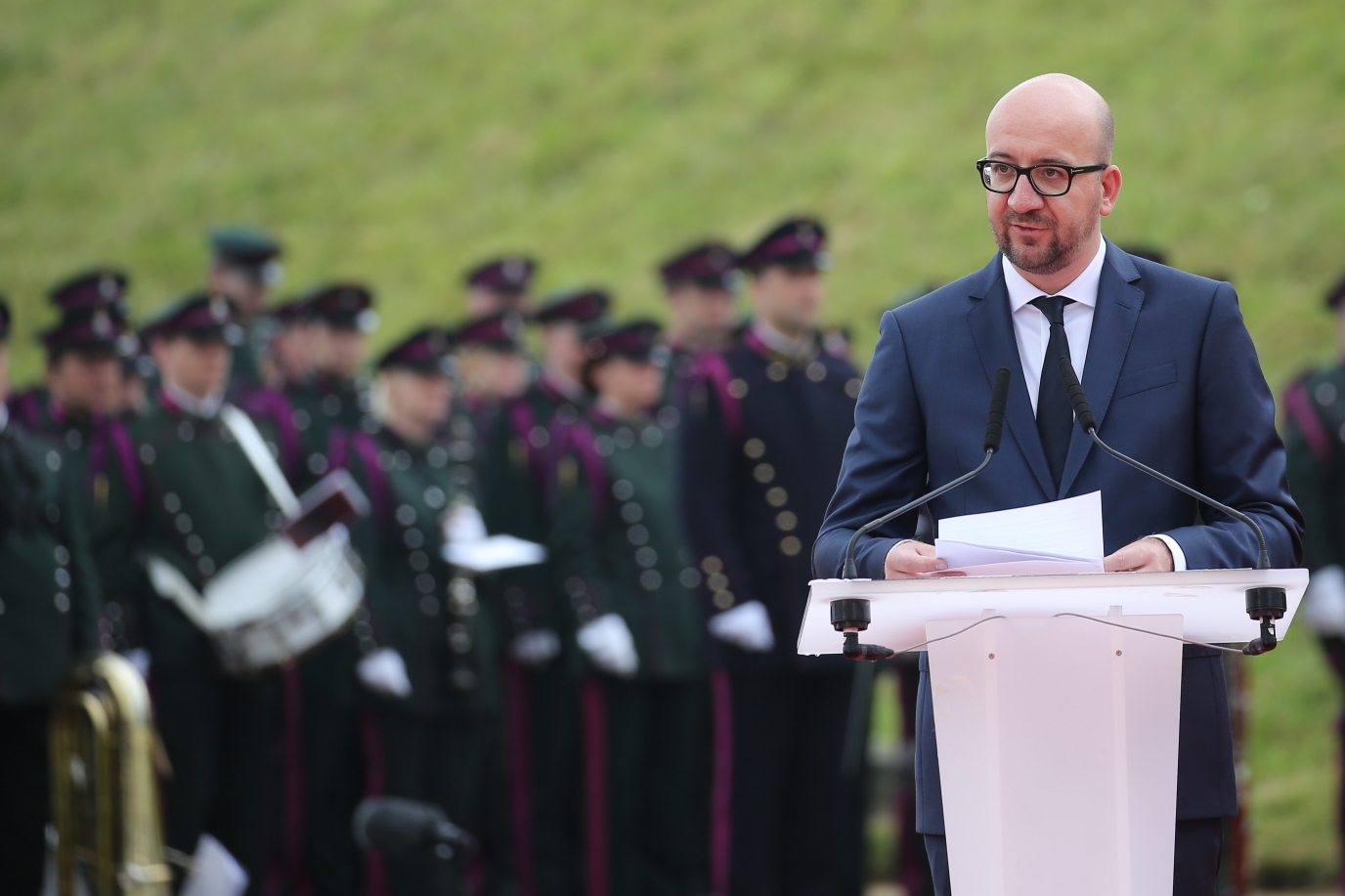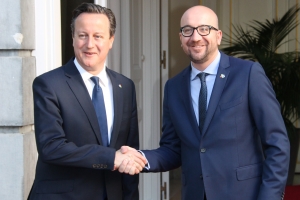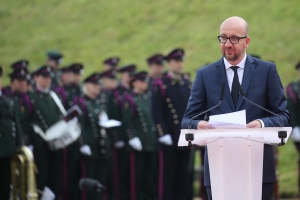Speech given at the official ceremony commemorating the Bicentenary of the Battle of Waterloo
 © SPF Chancellerie du Premier Ministre
© SPF Chancellerie du Premier MinistreSire,
Your Majesties,
Monseigneur,
Your Highnesses,
Distinguished Guests,
Excellencies,
Ladies and Gentlemen,
It was here. It was two centuries ago. Two hundred years to the day.
Waterloo: madness and grandeur. Horror and genius. Tragedy and then hope. And what if, at the end of the day, it was the inescapable destiny of mankind?
Our thoughts are first of all with the men and women who bravely fell on this battlefield. Their lives and dreams abruptly shattered.
For those who fought in the battle, Waterloo was both a defeat and a victory. For Napoleon, it was the end of his grandiose political and military dream.
For the coalition forces, it was a salutary victory over post-revolutionary imperialist ambitions.
Today, of course, we can look back at this historic event from a comfortable distance. Yesterday’s enemies are today’s staunchest allies – politically, economically and diplomatically.
In what will be a highly symbolic and significant act laden with emotion, the descendants of the main players involved in the battle will soon shake hands.
We are greatly honoured by the presence of the King of the Netherlands, Prince Blücher von Wahlstatt, Prince Napoléon and the Duke of Wellington. Your presence, side by side, and your actions are an inestimable sign of hope resolutely focused on the future.
Sire, Your Majesty,
I know that you had your heart set not only on attending this historic commemoration, but also on being involved in it. For that, I would like to thank you on behalf of the government.
I also salute the presence of the Grand Duke of Luxembourg and the Duke of Kent representing the Queen of England, as well as the ambassadors of France and Germany. Your presence is a sign of friendship – a friendship we value very highly indeed.
Actually, it is a reconciliation – more than a battle – that I wish to celebrate today.
Waterloo illustrates the dialectic of history.
Waterloo illustrate the process whereby enemy forces fight each other relentlessly, resulting in a tragic shock. And it is this dreadfully violent shock that later makes it possible to achieve broader unity and more solid harmony.
European unification is that reality.
In the wake of the tragedy and horror of multiple tragic armed conflicts, men and women of good faith decided to learn the lessons of the past. They opted to unite their dreams around a finer and greater project. The painstaking construction of the European Union.
Waterloo was a decisive and critical moment in the history of Europe.
It was here, at Waterloo, that the Concert of Europe triumphed for the first time. The alliances forged at the Congress of Vienna yielded the longest period of peace – 50 years – that Europe had ever known.
The Napoleonic era was not just the conflagration between the great nation states. It was, perhaps above all, a first sign of the European idea. On both Napoleon’s side and the side of the coalition forces.
Yes, Napoleon had an imperialist dream... but isn’t that already a form of European dream too?
At its peak, Napoleon’s empire covered nearly the entire continent, with the exception of Great Britain, right up to the gates of Russia. Definitely Europe, albeit not yet democratic. But that European area took form for the first time, if only briefly.
On the side of the coalition forces, a reality greater than the nation suddenly emerged. A sacred union between the great powers of Europe is essential, not only for fighting a common threat, but above all for ensuring peace, stability and prosperity.
Waterloo was a battlefield. But unfortunately, it was also the forerunner of total war. A new concept at the time, and one where all resources were deployed in an effort to destroy the enemy.
It was at Waterloo that war became synonymous with destruction. In that regard, Waterloo was, unfortunately, a dress rehearsal for what would be – a century later – the two biggest worldwide conflicts in history.
We recently came together in Liège, Nieuwpoort and Ypres to commemorate these dark pages from our history. I would like to thank the local and regional governments for all their efforts.
I would also like to thank all of the players involved in the monumental reconstruction we will see here today. Thanks to them, we can experience this grand event and pass it on to the younger generations.
Napoleon the person leaves nobody indifferent. There is no one else like Napoleon in human history. To some, he was an absolute hero. But to others, he was little more than a merciless warlord.
Napoleon was above all the author of an epic, with Europe as the theatre. He is also one of the eternal symbols of French grandeur. But perhaps grandeur always has a price.
Twenty years before Waterloo, philosopher Immanuel Kant published a small yet revolutionary essay entitled Perpetual Peace: A Philosophical Sketch. In it he called for the creation of a “League of Nations” in Europe linked by the virtues of trade, partnership and dialogue.
As you know, it took a century and a half before that dream became reality. First with the League of Nations, then with the United Nations. And later, Belgium, the Netherlands and the Grand Duchy of Luxembourg would be the pioneers in what would become the European Union.
The peoples of Europe have painful experiences of imperialism, fascism and totalitarianism. The peoples of Europe opted to unite for peace around a common destiny.
Visionary men such as Jean Monet, Robert Schumann and Konrad Adenauer devoted their intelligence and their talents to building this unprecedented miracle: peace that has reigned for nearly three quarters of a century.
Peace and stability are the necessary conditions for bolstering the rights of man, as inspired by the Enlightenment and the French Revolution.
Peace and stability are necessary conditions for forging the progress of humankind. And, in so doing, endowing hopes and dreams with body and heart.
Peace demands constant vigilance. Unfortunately, the temptation to wage war is always present in the world. In Libya, Iraq, Syria, Mali… but also at Europe’s gates. In Ukraine, men, women and children are right now coping with the appalling reality of war and the horrors it entails.
We must fight against the siren songs of egotism and withdrawal.
We must work relentlessly for openness, dialogue, understanding, tolerance, respect and diplomacy.
The Battle of Waterloo took place on this small territory at the heart of Europe. Many would not long later view this place – perhaps unintelligibly so – as being strategic. This territory, the future Belgium, would be destined to maintain a mysterious and intangible link with the future of Europe.
Brussels is the home of the European institutions and is a crossroads for advancing European unification one day at a time.
From Paul-Henri Spaak to Herman Van Rompuy, along with Jean Rey and many others, Belgium has often provided statesmen whose vision and intelligence have served the European ideal.
Every battlefield is drenched in blood. Waterloo is no exception. But, as they say, chaos creates beauty. What we need to commemorate in Waterloo is the rising importance of the European community.
Here for the first time people's warrior spirit was brought to a halt. Here a turbulent period of history came to an end. The creation of a peaceful balance of power. The start of a diplomatic network. The appearance of an international order.
After having visited the battlefield, I got a clear vision of how cruel a war can be. How a war can destroy lives and eradicate hope.
So before you all I wish to say more than ever… what we need to commemorate is the message of peace, harmony and concord.
What we are commemorating today is the message of peace, harmony and agreement.
Thank you for sharing this day with us.
Thank you for your attention.


